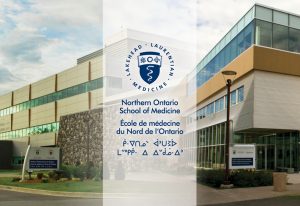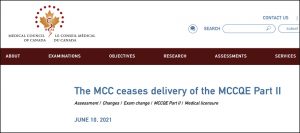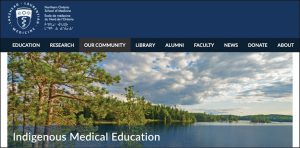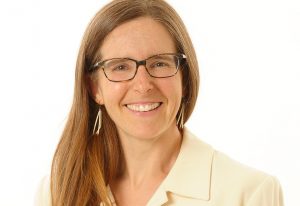NOSM became the first medical school to complete a two-step virtual accreditation visit for an MD program late last year.
This extensive, voluntary peer-evaluation process is critical to ensuring compliance with accepted standards for educational quality. Through accreditation, the Committee on Accreditation of Canadian Medical Schools (CACMS) provides assurance to medical students, graduates, the medical profession, health-care institutions, health authorities, regulatory authorities and—importantly, the public—that educational programs culminating in the award of the MD degree meet reasonable, generally-accepted, and appropriate national standards for educational quality.
CACMS has submitted their findings, and I’m pleased to share that NOSM has maintained its full accreditation of the MD program. As the saying goes, “it takes a village.” I extend my sincere gratitude to everyone who played a role in seeing us through this process. I want to acknowledge the work of the medical school self-study teams (which included NOSM faculty, staff and students), John Friesen, Cathy Powell, Dr. Catherine Cervin and all those who work with the MD program. Thank you to Drs. Lee Toner, Brian Ross and David Musson, NOSM’s current and former Associate Deans, who led the School through this accreditation process at different times over the past eight years.
I’m proud of the NOSM community for taking on the challenge, committing themselves to continuous quality improvements and being dedicated to finding solutions to obstacles, which are often beyond our control. Thank you to our stakeholders, including communities, health-care centres and hospitals, who truly make this a real team effort. We can all be proud of the many accomplishments and improvements we have implemented over the last several years which benefits our learners, learning environment, faculty and our MD program.
Recently, CACMS and the American Liaison Committee on Medical Education (LCME) came to an agreement that LCME would no longer review—but would continue to accredit—Canadian schools until 2025. This accreditation for NOSM will be amongst the first in Canada’s medical schools to be accredited by CACMS alone. Another historic first!
During the accreditation process, one of NOSM’s degree granting universities declared insolvency, which had a major financial impact on the school and certain standards of accreditation. Legislation to make NOSM a stand-alone degree granting institution was proposed and received Royal Assent. The CACMS report has taken into account these changes, I am pleased to tell you that NOSM University will continue to be fully accredited by CACMS and LCME.
Accreditation is an ongoing process. In fact, this accreditation cycle began shortly after our last review in 2012. I can assure you that the NOSM community has worked tirelessly to address all issues that required attention. And the work is not done. Of the total 95 elements that are required, the report identifies 10 elements which are “unsatisfactory” and 13 elements are “satisfactory with monitoring.” The issues raised by the Laurentian University insolvency, as one of our two degree granting institutions for the MD, played a key role in this outcome. Our strengths continue to be our award winning curriculum, the focus on social accountability and the excellence of our students, staff and faculty.
NOSM must address the areas of non-compliance within a specified time frame. This requires an action plan by August 2021, a new data submission by August 2022, and a limited follow up review in October 2022. Dr. Lee Toner, John Friesen, and their team will continue their work on these elements. They will have my unequivocal support.
To be very clear, NOSM’s MD program is fully accredited.
As a self-regulated profession, we have a collective responsibility to make sure we stay ahead of change. Now that Canadian medical schools have our own accreditation of MD programs, we have an opportunity to be even more responsive to our unique Canadian needs. For NOSM University, it means we will continue to focus on the specific needs of Northern Ontario.
Next up, is the accreditation visit of the residency programs by the Royal College of Physicians and Surgeons of Canada (RCPSC) and the College of Family Physicians of Canada (CFPC). This is scheduled to occur in November 2021. Stay tuned for reminders from Dr. Robert Anderson, Associate Dean, Postgraduate Medical Education and Health Sciences and the PGME Office over the next few months. A recent ‘mock accreditation’ identified the work needed to meet the standards in NOSM’s residency programs. Similar issues were raised such as: wellness, untimely student and faculty evaluation, lack of clarity about roles, and procedures for accommodations and complaints. In both the MD and residency programs, we must do better.
The accreditation of our programs is a key metric of our success. The goal is to contribute to the provision of high-quality and safe health-care services and to improve patients’ health outcomes where our graduates choose to practice. I am incredibly proud of NOSM’s MD program.
Finally, this week marks a milestone for me. It is the end of my second year here as Dean, President and CEO of NOSM. It has been quite a ride. The highlights are already historic – a pandemic, a partner’s insolvency, and a new NOSM University Act. What’s next?
Miigwetch, thank you, marsi, merci,
Dr. Sarita Verma
Dean, President and CEO
Northern Ontario School of Medicine
If you have any feedback or comments, please reach out at dean@nosm.ca and follow me on twitter @ddsv3.
Subscribe to Northern Routes

NOSM University
We are planning a series of consultations over the summer to ask your valued thoughts on the future of NOSM U. Do you have a meeting or event planned where a discussion on NOSM U would be valuable? Do you have comments or questions? Please see nosm.ca/nosmu and send questions to nosmu@nosm.ca.

Welcome to NOSM’s new residents
At the end of day on June 30, you have transitioned from a medical student to a resident doctor and the residents before you become independent, practising doctors. It’s always such an exciting time, yet these transitions can be equally unnerving. We care for our learners and alumni and protect your wellness. Welcome to NOSM! I hope you enjoy postgrad. It is the best experience here.

MCCQE II Update
The Medical Council of Canada (MCC) confirmed that it is “stepping away” from the MCC Qualifying Examination (MCCQE) Part II. The MCC Council updated criteria informing policy on the granting of the Licentiate of the Medical Council of Canada (LMCC) to candidates meeting requirements listed on the MCC website.

New Indigenous Medical Education Site
NOSM is committed to continuing to build with First Nations and Métis peoples of Northern Ontario to promote a healthier North, minobimaadziwin. The Indigenous Affairs Unit recently updated the NOSM website to include inspirational stories, resources and reports, and detailed information for Indigenous applications to the MD program.

Community Report
I’m proud to introduce you to a new type of report that brings the spirit of our medical school to life. You will hear from our NOSM community directly—those motivated to make quality health care accessible to everyone in the region. Learn more at report.nosm.ca.

Inaugural Academic Director of NOSM’s Centre for Social Accountability
Dr. Erin Cameron is the inaugural Academic Director of the Centre for Social Accountability (CFSA) beginning a three-year term on July 1, 2021. The Centre is the only one of its kind in Canada with a core mandate to improve the health of Northern Ontarians, reaching beyond NOSM’s founding commitment to be socially accountable in education, research programs and in advocacy for health equity.








